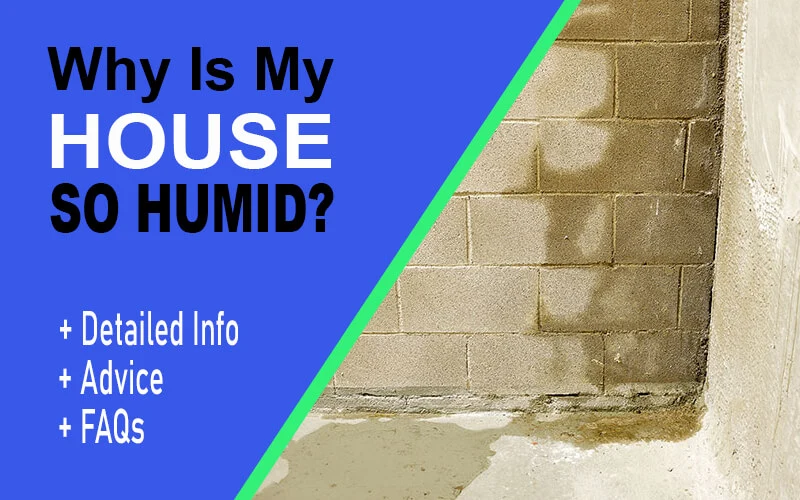Why is My House So Humid? [Info + Advice + FAQs] 2023
Why is my house so humid? If your house is feeling extra humid, it might be because of the weather outside, or it could be an issue with your home. Your home can feel stuffy and mold can grow if there is a high humidity in a house.
If you don’t know why is my house so humid? If you’re unsure what’s causing the excessive humidity in your home, it’s best to call a professional to take a look. During this time, you can do a few things to improve the condition. Try opening some windows to let in some fresh air and running a dehumidifier to help remove some moisture from the air.
Why Is My House So Humid?
The relative humidity in your home is affected by various factors, including the design, size, construction, and materials of your home, the use of vapor retarders, insulation, and how airtight your property is.
It is possible for all of these factors to impact the relative humidity in your home and, in turn, the amount of moisture in the warm air. Design and construction: How your home is designed and constructed can affect the amount of moisture in the air / warmer air and, as a result, the relative humidity. For example, if your home is not well-insulated, warm air from outside can enter your home and cause the relative humidity to increase, it will make your home uncomfortable.
How Do I Fix High Humidity in My House?
So, how to decrease humidity in house? There can be many ways to control humidity in your home. You can fix the humidity in your house in a some different ways. Typically, a dehumidifier is used. Moisture is absorbed by dehumidifiers by pulling it from the air. This helps to lower humidity levels and overall humidity problem in a house.
Air conditioners can also help to lower the humidity in a house. Air conditioning units are used to cool air and remove dampness. Its not work as air conditioning unit (ac unit) but also HVAC system.
If you do this in your home, you may be able to control humidity indoors and remove moisture from the air. Air conditioning system might be expensive but high quality air conditioning system always helps to save your money and home too. Keep that in your mind that if area is very large then air conditioning system is not much effective to maintain temperature and humidity level and house feels humidity indoor and keep home humid.
What Causes High House Humidity?
So here are the reason to why is my house so humid? Several factors can contribute to high humidity in a home. The moisture in the air can be increased by everyday activities such as cooking, washing, and showering. Poor ventilation can cause high humidity level. The indoor humidity can increase if it is not adequately ventilated or has no proper ventilation.
Also, homes located in warm or humid climates may experience higher level of humidity and keep your home feel humid. There are various ways to combat high humidity levels in a home and humidity from the air, such as using a dehumidifier or opening windows and doors to allow for better air circulation.
Is Too Much Moisture & Humidity Hurting Your Health?
Too much moisture and humidity can have several adverse effects on the human body. In addition to causing low energy, lethargy, and skin problems, it can also cause respiratory problems. A person’s humidity in the air is set on by how much water vapor it holds. It is invisible to see water vapor in its gaseous state.
When the amount of humidity is determined in a given temperature, it refers to the ratio between the amount of water vapor in the air and the amount that is possible for the air to hold at that temperature. This can happen at different temperatures for different air masses, but air at sea level can hold more water vapor than air at higher elevations.
Can Too Much Humidity Cause Shortness of Breath?
High humidity inside of your home can cause shortness of breath, especially in individuals who suffer from COPD or other respiratory conditions. When the air is more humid (in air or inside a home) it contains more water vapor and is thus denser.
This means that the lungs must work harder to draw in the same amount of air, which can lead to shortness of breath and fatigue. In extreme cases, high humidity problem in your home can even cause suffocation.
Causes of High Humidity Even When the AC Is Running?
It’s possible to have an elevated humidity inside your house. If you have a hot and humid room you have extremely high humidity. Problem is with cooling. The biggest problem with high humidity is if the air conditioner does not dry air in your home properly. Even sometime air conditioners costs more than dehumidifiers.
It is expected that evaporator coils in air-conditioning should remove humidity in the home. It accepts liquids and can cool you down. The iced evaporator coil does not decompress the air. You must always monitor your conditioned system for any possible damage.
How Humidity Affects Cooling?
Excessive moisture in your home can collect heat, which may raise the temperature. Therefore, you will need a heat pump or cooling system for reducing condensation as well as to prevent condensation in the room.
It could make Michigan great for growing blueberries, but it could make the house too cold to sleep comfortably and feel cold air outside.
Human body heat is maintained via sweat. Nevertheless the air is saturated with water that evaporated easily. When humidity is 100 ppm, it will not evaporate since air has been completely saturated by water, and can be.
Symptoms of High Humidity in Your Home
How can one know how humid it is? what are high humidity in house symptoms? what is your home humidity level? The frequent feeling of excessive heat inside your house can cause sweating.
Having the sensation of being sticky can cause severe discomfort in some cases. Sweat cannot escape due to high moisture content in humid rooms, causing little relief.
Another clear indicator for excess humidity inside your home is sleeping poorly in the evening. The Sleep Foundation says that high indoor humidity affects sleep. The authors say the lack of humidity and moisture affect the sleeping cycle negatively.
What’s the Difference between High Humidity and Low Humidity?
“It isn’t heat but moisture”. These terms are well-known in people’s lives. You may use it yourself. How do we measure moisture levels? Essentially, humidity measures the increased or reduced moisture content in the air.
If the air is able to hold more moisture, the atmosphere becomes more humid. When air is not kept dry, it becomes dry. Usually, people feel comfortable at moderate humidity. Lack of humidity can affect your life as well as your property.
FAQs: Why is My House So Humid?
What are effects of indoor or outdoor humidity?
Humid home can also destroy interior of your house. Try to avoid the activities which causes humidity and keeps the home’s humidity level high.
Indoor Humidity: Indoor humidity is a major factor affecting indoor air quality, with adverse effects on both plants and humans. In many cases, when humidity is too high, it can cause dust mites, mold and mildew to grow colonies and fungi to thrive, which can lead to smell and noise issues. The lack of oxygen also leads to plant growth problems, as well as distortion of sound waves. Additionally, high humidity can increase the risk of developing asthma due to increased pollen allergies. So try to keeping the humidity levels, less humid.
Outdoor Humidity: Outdoor humidity is a major factor that affect the plants and animals in an outdoor setting. Canopy trees, for example, are known to suffer from drought and low humidity levels. When it’s humid outdoors, the pollen production of these trees is increased. Additionally, birds will find it harder to fly because the airspace is too crowded with pollen. When out door humidity is high it also causes increased indoor humidity level inside home. Try to maintain level of humidity as well as temperature of humid houses.
Is 70 percent humidity high?
It is high when the humidity reaches 70 percent. However, the high humidity level can vary depending on the temperature and the specific location. In general, humidity levels above 65 percent are considered high and can be oppressive.
What is ideal humidity level?
It ranges between 30 and 60% in a home. Higher than that and you may experience condensation, and lower than that and you may experience mold growth. If you’re a bit more precise about it, the ideal humidity level is between 45 and 55 percent for every single room in your house, according to the U.S. Department of Energy. Humidity levels should be measured with an error of less than plus or minus 5 percent.
How much humidity do I need?
In the summer and fall, we’re usually in the mid-40s or higher. The temperature commonly drops to the 20s and 30s in the winter. But the most humid time of year is spring and early summer. Humidity level inside your home vary room to room. If anyone is feeling in your house humidity, always try to maintain and reduce the humidity level of whole house because humidity can cause problems in your healthy life.
How can I keep my house cool?
I suggest installing an automated thermostat. It’ll automatically turn your air conditioner on when it’s hot outside and off when it’s cooler and control indoor humidity. This will enable you to save money, since you won t have to pay for cooling while it’s daytime. The most common type of programmable thermostat is the timer, which lets you set the temperature at any time. Some even let you set the schedule that the thermostat will follow. A programmable thermostat is easy to install. Just open the housing and plug in the wires.
Does humidity cause weight gain?
Many factors contribute to weight gain, and humidity is one of them. When the air is humid, it holds more water vapor, which can lead to increased appetite and cravings. This can cause people to eat more, leading to weight gain.
Additionally, humid air conditions can make people feel tired and sluggish, which can decrease physical activity. This can also lead to weight gain. While humidity is not the only factor contributing to weight gain, it can certainly play a role. But try to improve in air quality and reduce humidity by maintaining and removing moisture levels in your home.
Does humidity affect blood pressure?
Some evidence suggests that humidity may affect adults with high blood pressure. One study showed that blood pressure readings were higher when the humidity was increased. There is, however, uncertainty about whether this is a cause-and-effect relationship or if other factors are involved.
Excess moisture may affect the body’s ability to generate or maintain heat, which affects blood pressure. In order to confirm that blood pressure and humidity are linked, more research is required.
Why do I swell up in humidity?
One reason is that heat and humidity can cause your body to retain water. When your body contains water, it can cause your legs to puff up.
There are a number of reasons why the body’s ability to circulate blood might be hindered by damp conditions. When circulation is poor, it can cause swelling. Finally, humidity can also cause your skin to expand, leading to swelling.
Is it OKAY to leave a dehumidifier running all day?
Dehumidifiers are devices and a way to reduce humidity that cycle the air in a room or house to decrease humidity levels.
One problem with its users is that they can leave their units on all day, which can lead to an extremely high level of humidity in the room. So this can contribute to the humidity level and increased humidity can be a problem for the structure of your home and health.
If you have a dehumidifier in your home, it may be best to turn it off at night or when you’re not using it. Humidifiers can help keep your home smelling fresh and clean. Air purifiers can help keep you healthy by filtering out harmful pollutants. So use dehumidifiers to decrease humidity in your home and air purifiers to control pollutants in it’s humid outdoor and humid environment.
What are Risks of too Much humidity?
The humidity in a home can be extremely high in winter and can lead to deteriorating health conditions. The excessive humidity inside the house is associated with bronchodilation. Excess humidity causes allergies and asthma, causing spores like mold growth and mildew growth.
Conclusion
If your house is particularly humid, it might be due to several reasons, such as the climate you live in, your home’s materials, or even activities you regularly do. Humidity can be controlled with several methods, including running a dehumidifier, opening windows and doors, and using an exhaust fan. If you’re uncertain why your home is so humid, don’t hesitate to seek professional assistance.


![Savvy! How Much Does a Whole House Water Softener Cost? [2023]](https://prohouseideas.com/wp-content/uploads/2022/08/how-much-does-a-whole-house-water-softener-cost-768x480.webp)

![Solved – Types of Humidifiers [Which One is Best?] 2023](https://prohouseideas.com/wp-content/uploads/2023/01/types-of-humidifiers-768x480.webp)


![Diffuser vs Humidifier vs Vaporizer: [+Differences] 2023](https://prohouseideas.com/wp-content/uploads/2023/01/diffuser-vs-humidifier-vs-vaporizer-768x480.webp)